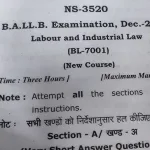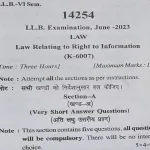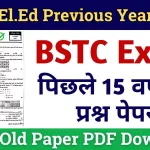3-year LLB courses cover a wide range of subjects, including law principles, constitutional law, contracts, criminal law, and more. Practicing previous years’ question papers can help you prepare effectively for exams. This guide provides a comprehensive set of questions and answers to enhance your learning and exam preparation.
Constitutional Law Questions and Answers
Question: What is the basic structure doctrine in Indian Constitutional Law?
Answer: The basic structure doctrine states that certain fundamental aspects of the Constitution cannot be amended by Parliament under Article 368.
Question: Explain the concept of Rule of Law.
Answer: Rule of Law implies that all individuals, including the government, are subject to the law and no one is above it.
Question: What is the significance of Article 32?
Answer: Article 32 provides individuals the right to approach the Supreme Court for the enforcement of fundamental rights.
Question: Define ‘secularism’ as per the Indian Constitution.
Answer: Secularism ensures that the state treats all religions equally and does not favor or discriminate against any religion.
Question: What is the procedure for amending the Constitution?
Answer: Constitutional amendments can be initiated by introducing a bill in Parliament and require approval by a two-thirds majority in both Houses and, in some cases, ratification by half of the state legislatures.
Question: Explain the difference between Fundamental Rights and Directive Principles of State Policy.
Answer: Fundamental Rights are enforceable by law, while Directive Principles are guidelines for governance and are non-enforceable.
Question: What is the scope of Article 14?
Answer: Article 14 ensures equality before the law and equal protection of the law to all individuals within the territory of India.
Question: What is the significance of the Ninth Schedule?
Answer: The Ninth Schedule protects certain laws from being challenged on the grounds of violating fundamental rights.
Question: What is the doctrine of separation of powers?
Answer: The doctrine of separation of powers divides the functions of the government into three branches: legislative, executive, and judiciary, to prevent concentration of power.
Question: Explain the meaning of Habeas Corpus.
Answer: Habeas Corpus is a legal writ used to bring a person before the court to determine if their detention is lawful.
Contract Law Questions and Answers
Question: What are the essential elements of a valid contract?
Answer: The essential elements include offer, acceptance, consideration, intention to create legal relations, and lawful object.
Question: Define ‘consideration’ in contract law.
Answer: Consideration is something of value exchanged between parties to a contract as part of the agreement.
Question: What is the difference between void and voidable contracts?
Answer: A void contract is unenforceable by law, while a voidable contract is valid but can be annulled by one party.
Question: Explain the term ‘breach of contract.’
Answer: Breach of contract occurs when one party fails to fulfill their obligations as per the contract terms.
Question: What is meant by ‘specific performance’?
Answer: Specific performance is a legal remedy requiring the breaching party to perform their contractual obligations.
Question: What is an invitation to treat?
Answer: An invitation to treat is an invitation for others to make offers, such as displaying goods in a store.
Question: Define ‘capacity to contract.’
Answer: Capacity to contract refers to the legal ability of a person to enter into a contract, typically requiring them to be of sound mind and above the age of majority.
Question: What is the difference between a contract of indemnity and a contract of guarantee?
Answer: A contract of indemnity involves compensation for loss, while a contract of guarantee involves a promise to answer for the debt of a third party.
Question: What are contingent contracts?
Answer: Contingent contracts are agreements that depend on the occurrence or non-occurrence of an uncertain future event.
Question: Explain the concept of quasi-contracts.
Answer: Quasi-contracts are obligations imposed by law to prevent unjust enrichment, even though no actual contract
exists between the parties.
Criminal Law Questions and Answers
Question: Define ‘crime’ in the context of criminal law.
Answer: Crime is an act or omission that is prohibited by law and punishable by the state.
Question: What are the essential elements of a crime?
Answer: The essential elements include actus reus (the guilty act) and mens rea (the guilty mind).
Question: What is the difference between culpable homicide and murder?
Answer: Culpable homicide is the causing of death with intent but without premeditation, while murder includes premeditated intent to kill.
Question: Explain the meaning of ‘mens rea.’
Answer: Mens rea refers to the mental state or intention to commit a crime.
Question: What is the principle of double jeopardy?
Answer: Double jeopardy ensures that no person can be prosecuted or punished twice for the same offense.
Question: What is the purpose of bail in criminal cases?
Answer: Bail is a legal process to secure the temporary release of an accused person pending trial while ensuring their presence in court.
Question: What is meant by ‘self-defense’?
Answer: Self-defense is the right to protect oneself or others from immediate harm, using reasonable force.
Question: Define ‘abetment’ in criminal law.
Answer: Abetment involves encouraging, instigating, or aiding another person to commit a crime.
Question: What is the difference between theft and robbery?
Answer: Theft involves taking someone’s property without consent, while robbery involves theft with force or intimidation.
Question: Explain the concept of ‘insanity defense.’
Answer: The insanity defense argues that the accused lacked the mental capacity to understand the nature of the crime due to a mental disorder.
Family Law Questions and Answers
Question: What are the grounds for divorce under Hindu law?
Answer: Grounds include adultery, cruelty, desertion, conversion, mental disorder, and incurable disease, among others.
Question: Define the term ‘maintenance’ in family law.
Answer: Maintenance refers to financial support provided to a spouse, children, or parents under legal obligation.
Question: What is the concept of joint family property?
Answer: Joint family property is property owned collectively by members of a Hindu joint family under customary law.
Question: What is the difference between judicial separation and divorce?
Answer: Judicial separation allows spouses to live apart without dissolving the marriage, while divorce terminates the marital relationship.
Question: Explain the concept of adoption under Hindu law.
Answer: Adoption under Hindu law is a legal process by which a person takes a child as their own, conferring all rights and responsibilities of a biological child.
Question: What is the legal age for marriage in India?
Answer: The legal age for marriage is 18 for women and 21 for men.
Question: Define the term ‘bigamy.’
Answer: Bigamy refers to marrying someone while still legally married to another person.
Question: What is a ‘void marriage’?
Answer: A void marriage is invalid from the outset and has no legal standing.
Question: What is the difference between guardianship and custody?
Answer: Guardianship involves legal responsibility for a minor’s welfare, while custody refers to the physical care and control of the child.
Question: Explain the concept of dowry prohibition.
Answer: Dowry prohibition makes giving, taking, or demanding dowry a punishable offense under Indian law.
Practicing previous years’ question papers for the 3-year LLB program aids in understanding the exam pattern and topics effectively. This guide provides a variety of questions and answers across different subjects, ensuring comprehensive preparation for law exams. Studying systematically will help improve knowledge and boost confidence during examinations.
Related Posts:
Latest Posts
- Step-by-step guide to download and apply for jee mains admit card 202
- Comprehensive 2025 government holidays and recruitment details for job seekers
- JEE Mains Admit Card 2025: Your Step-by-Step Guide to Downloading the Hall Ticket
- Everything You Need to Know About 2025 Government Holidays Recruitment
- Comprehensive Guide to rrb d group recruitment 2025 – Eligibility, Vacancies, and Application
- Detailed guide to nps trust recruitment 2025 vacancies, eligibility and apply process
- Comprehensive guide to hpcl recruitment 2025 notification, vacancies, and application process
- ignou bed admission 2025 complete recruitment guide with eligibility and process
- Comprehensive Guide to Indian Army Agniveer Recruitment 2025 Notification and Jobs
- Everything You Must Know About CBSE Board Exams 2025 Changes & New Rules






